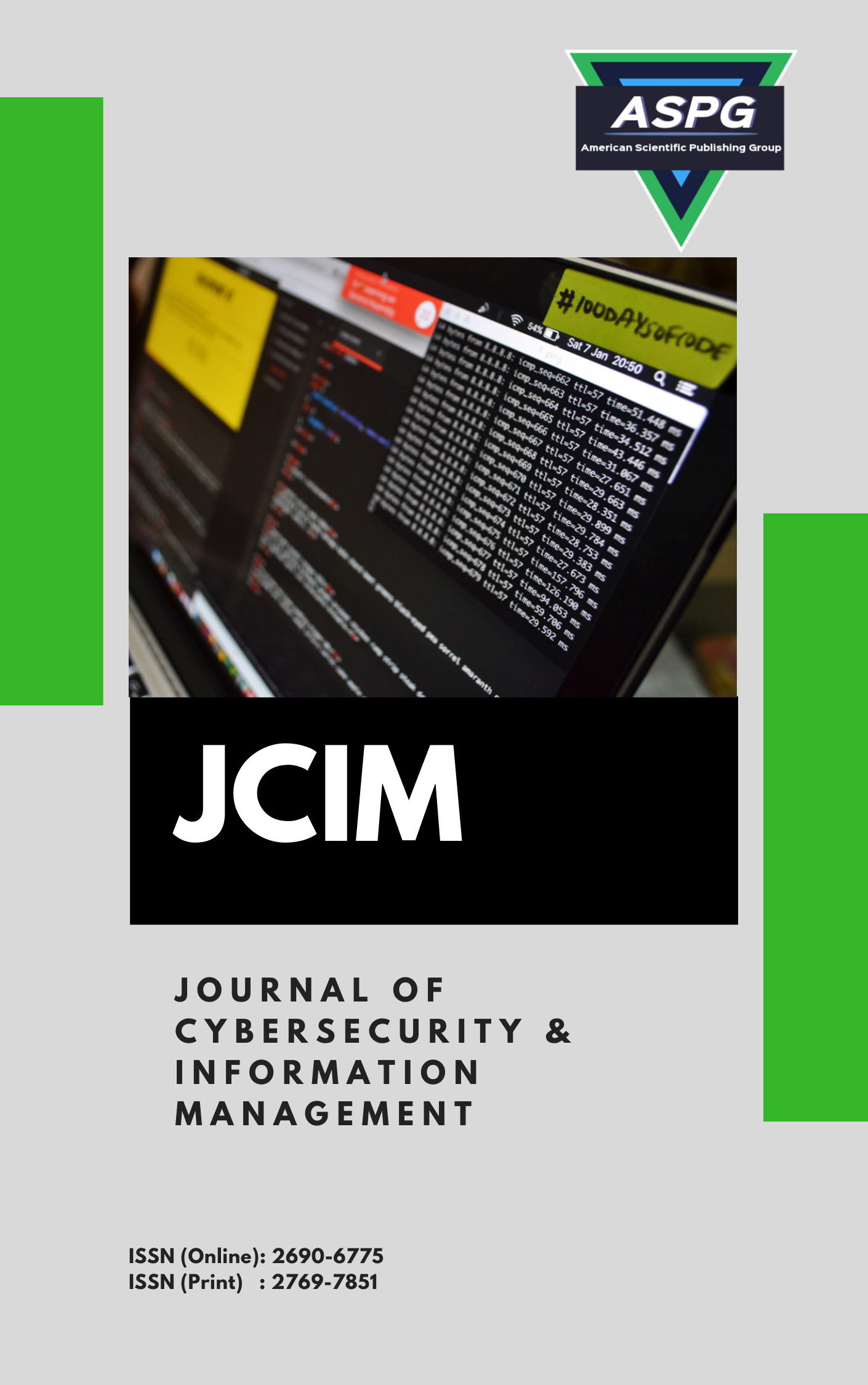

Volume 15 , Issue 1 , PP: 233-243, 2025 | Cite this article as | XML | Html | PDF | Full Length Article
Salah N. Mjeat 1 , Mohammed Yousif 2 * , Salim Bader 3 , Osama Mohammed 4 * , Ahmed Hikmat Saeed 5
Doi: https://doi.org/10.54216/JCIM.150118
Real-time health monitoring and data collection are possible now due to the introduction of Internet of Things (IoT) in modern healthcare systems. Continuous monitoring enables healthcare providers to find and treat potential health problems early, tailor treatment plans specific to the individual patients, and make better clinical decisions resulting in a higher quality of care. From the benefits of integrating IoT in healthcare to security issues being raised when data is collected or transmitted (as health information becomes a sensitive resource). Patient's health information is very confidential and secrecy, any act that disclosed this data in the wrong way can have more implications than just patient identity thefts and financial fraudulence. In this study, we introduce that in order to solve the security and privacy issues of IoT devices in healthcare systems; we present Block chain-based Security-enhanced Public Key Infrastructure (PKI). The solution integrates the decentralized component of blockchain with its automated and standardized functionality for processing all actions afterwards, which allows such a data access as never before. This is a unique feature of blockchain: once data has been entered onto the ledger, it cannot be changed or deleted - meaning that an irrevocable record exists for each transaction. These provide future IoT devices with medical data that remain compliant keeping your health information sanitary. The other advantage of this decentralized solution is that it allows data to be accessed and stored globally, thus improving the availability and robustness of all components in case anyone fails. The Public Key Infrastructure (PKI) on an already existing blockchain platform, this only makes its security even more solid. Our solution assigns the reliability of safety and encrypted interaction among different section in our healthcare infrastructure through PKI cryptographic keys with digital certificates. Additionally, the proposed blockchain PKI improves security while addressing scalability and interoperability challenges that traditional centralized systems cannot solve, all without relying on an expensive third-party certifying authority.
Blockchain , Public Key , Healthcare , Internet of Thing , Key management
[1] Ahmed, O. (2024). Enhancing Intrusion Detection in Wireless Sensor Networks through Machine Learning Techniques and Context Awareness Integration. International Journal of Mathematics, Statistics, and Computer Science, 2, 244–258. https://doi.org/10.59543/ijmscs.v2i.10377
[2] A. Banaee, H., Mishra, J., & A. S. Cueto, “Diagnosis and prognosis of disease via wearable sensors and IoT,” J. Healthc. Eng., 2013, doi: https://doi.org/10.1155/2013/345028.
[3] X. Xu, J., Yang, X., & Wang, “The role of IoT in improving healthcare management and outcomes,” Healthc. Technol. Lett., vol. 1, no. 8, pp. 17–24, 2021, doi: https://doi.org/10.1049/htl2.12024.
[4] M. Alamri, A., Haider, S., & Alshamrani, “A comprehensive review on IoT-based healthcare systems: Challenges and future directions,” J. Healthc. Eng., 2020, doi: https://doi.org/10.1155/2020/8386967.
[5] Z. Chung, W. Y., Han, J., & Zhang, “Wearable health monitoring devices and their impact on healthcare,” IEEE Access, vol. 9, pp. 106973–106982, 2021, doi: https://doi.org/10.1109/ACCESS.2021.3106202.
[6] Y. Yang, X., Huang, X., & Liu, “Leveraging IoT for chronic disease management: A comprehensive review,” Comput. Biol. Med., vol. 142, p. 105065, 2022, doi: https://doi.org/10.1016/j.compbiomed.2022.105065.
[7] R. Yuvasri and A. Manimaran, “A Secure Key Exchange Protocol and a Public Key Cryptosystem for Healthcare Systems,” Contemp. Math., vol. 5, no. 2, pp. 2402–2418, 2024, doi: 10.37256/cm.5220243942.
[8] S. Sikder, A. K., Natarajan, S., & Ghosh, “IoT security and privacy: A survey of current challenges and solutions,” Internet Technol. Lett., vol. 4, no. 5, p. 286, 2021, doi: https://doi.org/10.1002/itl2.286.
[9] M. Rao, A. R., Srinivasan, M., & Nair, “A survey on cybersecurity threats and privacy issues in IoT-based healthcare systems,” Comput. Secur., vol. 114, p. 102596, 2022, doi: https://doi.org/10.1016/j.cose.2022.102596.
[10] Q. Li, X., Yang, Y., & Li, “Security and privacy issues in the IoT-based healthcare systems: A survey,” IEEE Access, vol. 8, pp. 67891–67904, 2020, doi: https://doi.org/10.1109/ACCESS.2020.2982285.
[11] J. Yang, W., Li, W., & Lu, “Emerging threats and countermeasures for IoT security in healthcare environments,” Futur. Gener. Comput. Syst., vol. 135, pp. 335–350, 2023, doi: https://doi.org/10.1016/j.future.2022.08.004.
[12] H. Moubarak, A., Elmaghraby, A., & Al-Khateeb, “Blockchain technology in healthcare: A survey,” Futur. Gener. Comput. Syst., vol. 116, pp. 162–182, 2021, doi: https://doi.org/10.1016/j.future.2020.11.010.
[13] H. Zhang, Y., Wu, Y., & Li, “A survey on blockchain technology and its applications in IoT-based healthcare systems,” J. Netw. Comput. Appl., vol. 168, p. 102812, 2020, doi: https://doi.org/10.1016/j.jnca.2020.102812.
[14] E. Turan, S. Sen, and T. Ergun, “A Semi-Decentralized PKI Based on Blockchain With a Stake-Based Reward-Punishment Mechanism,” IEEE Access, vol. 12, no. April, pp. 60705–60721, 2024, doi: 10.1109/ACCESS.2024.3394657.
[15] S. Sikder, A. K., Natarajan, S., & Ghosh, “Blockchain for securing IoT-based healthcare systems: A comprehensive survey,” J. Comput. Secur., vol. 103, p. 102322, 2021, doi: https://doi.org/10.1016/j.jocs.2021.102322.
[16] O. T. Khan, R., Alsaadi, S., & Bafakeeh, “Blockchain-based solutions for IoT security and privacy: A survey,” IEEE Access, pp. 45118–45141, 10AD, doi: https://doi.org/10.1109/ACCESS.2022.3172620.
[17] H. Mayer, S., Slama, P., & Xu, “A comprehensive survey of public key infrastructure: Cryptographic mechanisms and applications,” IEEE Trans. Netw. Serv. Manag., vol. 19, no. 1, pp. 86–103, 2022, doi: https://doi.org/10.1109/TNSM.2021.3108435.
[18] X. Zhou, J., Yang, Q., & Xu, “Public key infrastructure in blockchain-based healthcare systems: Challenges and opportunities,” J. Blockchain Res., vol. 3, no. 2, pp. 134–146, 2020, doi: https://doi.org/10.1016/j.jblcr.2020.04.001.
[19] J. Yang, W., Zong, B., & Lu, “Blockchain and PKI integration for enhanced security in IoT-based healthcare systems,” Comput. Secur., vol. 115, p. 103741, 2023, doi: https://doi.org/10.1016/j.cose.2022.103741.
[20] A. Garg, S., Patel, K., & Khosravi, “Integration of PKI and blockchain for secure healthcare data management: A review,” IEEE Access, vol. 9, pp. 50702–20717, 2021, doi: https://doi.org/10.1109/ACCESS.2021.3060139.